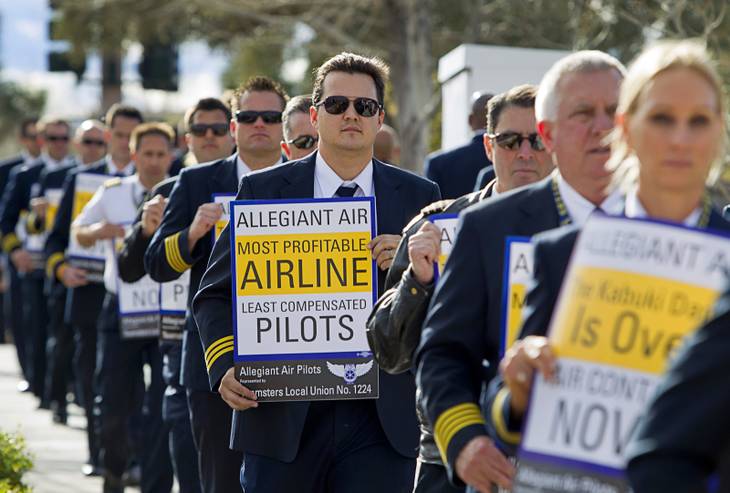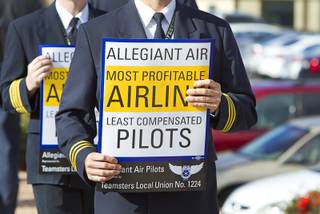A federal judge has tabled a short-lived effort by Allegiant Air pilots to go on strike, an attempted escalation in a lengthy labor dispute that would have grounded hundreds of flights.
U.S. District Judge Gloria Navarro today granted Allegiant a temporary restraining order against Teamsters Local 1224, which represents the pilots and announced hours earlier that the aviators would walk off the job Thursday.
The strike would have affected 33,000 passengers the first day alone, including thousands headed to Las Vegas for NCAA Final Four basketball events, the union had said.
Las Vegas-based Allegiant — a discount carrier known for cheap fares, a large menu of add-on fees and consistent profits — has 67 scheduled flights in and out of McCarran International Airport on Thursday, according to the airport’s website.
It would have been Allegiant’s first strike for any employee group and was poised to last indefinitely, Allegiant pilot and union activist Tom Pozdro said earlier today. All of Allegiant’s more than 500 pilots would have participated, even though a small number aren’t Teamsters members, he said.
Navarro, chief judge of the district of Nevada, ordered the union and its members to not encourage or participate in “any strike, work stoppage, picketing, sick-out, slow-down, work-to-rule campaign” or other move that aims to disrupt Allegiant’s regular operations.
She also set a hearing in the case for 10 a.m. April 10, before U.S. District Judge Andrew Gordon.
Allegiant, which initially said the “irresponsible and illegal” strike would disrupt its flights and passengers at every destination, claimed victory in today’s back-and-forth labor fight.
After Navarro issued her order, the company sent out a press release headlined “Holiday Weekend Pilots’ Strike Averted” and saying all flights would operate normally.
At a press conference today at Allegiant’s headquarters in Summerlin, Chief Operating Officer Steve Harfst, standing in a crowded hallway with a scrum of reporters, said the strike had “less to do with our pilots” than it did with the national Teamsters union “and their agenda.”
Asked what that agenda is, he said, “You’ll have to ask them. I don’t know. But all I can say is the company is looking forward to getting past this.”
A union representative did not immediately respond to a request for comment on his remarks.
After Navarro’s ruling came out, though, the union said it would abide by it, saying the strike is “on hold.”
In a prepared statement, Allegiant pilot Corey Berger said company executives “are pocketing millions while reducing benefits for pilots,” and that going on strike was “a last resort.”
The union says Allegiant refuses to re-establish a prior scheduling system and restore benefits that have been “illegally rolled back” over a two-year stretch of record profits.
Pozdro said pilot-seniority used to have more weight in determining monthly schedules. The current, more automated system sometimes gives less-experienced pilots better schedules than longer-tenured aviators and makes it more difficult for pilots to get back home, Pozdro said.
“Although we know that our strike to restore the status quo is legal, we will comply with the judge’s decision and look forward to having our voices heard at the upcoming hearing,” Berger said.
The Teamsters had announced shortly before 11 a.m. today that Allegiant pilots — who voted in mid-January to authorize a strike — would not fly regularly scheduled routes Thursday.
More than 250 flights could have been canceled that day because of the strike, the union said.
The threat apparently spooked investors. Shares of Allegiant Travel Co., the carrier’s parent, dropped nearly 6.6 percent today to $179.65 apiece.
By comparison, the Dow Jones Industrial Average, a stock-market performance gauge, fell just 0.44 percent.
Allegiant had sued the pilots’ union Monday in federal court to prevent an “imminent” strike that, according to the company, would cost Allegiant millions of dollars a day in lost revenue. It would also erode the airline’s standing with passengers, who “would certainly be less likely to fly Allegiant in the future,” the company said in the lawsuit.
The threatened strike, Allegiant argued, is illegal under U.S. labor law because the union and the airline haven’t tried every possible measure to end their dispute, Bloomberg News reported.
At the press conference today, Harfst said Allegiant executives got “no advanced warning whatsoever” of the Teamsters’ decision to strike.
When it was pointed out that his company’s lawsuit two days ago said the strike was imminent, he said, “That’s just based on what we were hearing in the press, same as you. The Teamsters did not tell us directly that they were gonna strike.”
Allegiant pilots voted to join the Teamsters in August 2012, but since then, negotiations to establish their first contract under the union have failed, Pozdro said.


